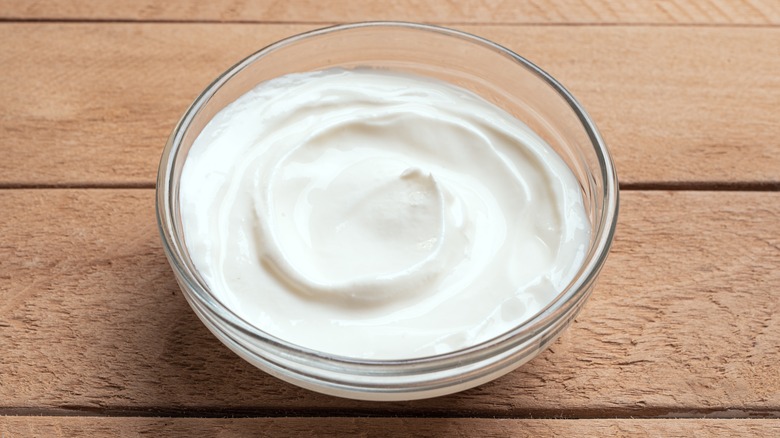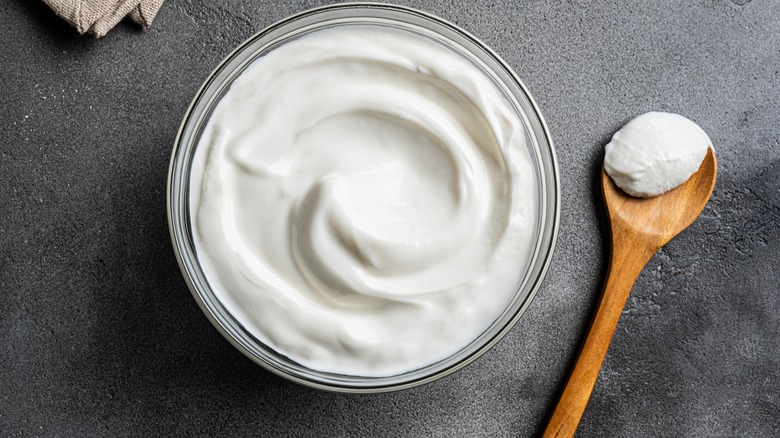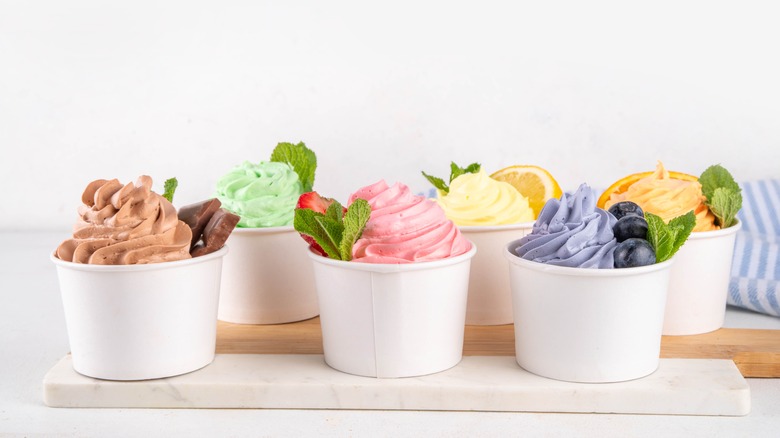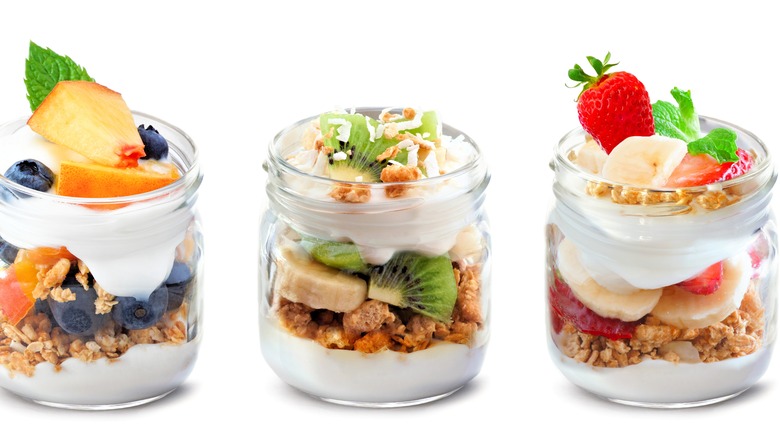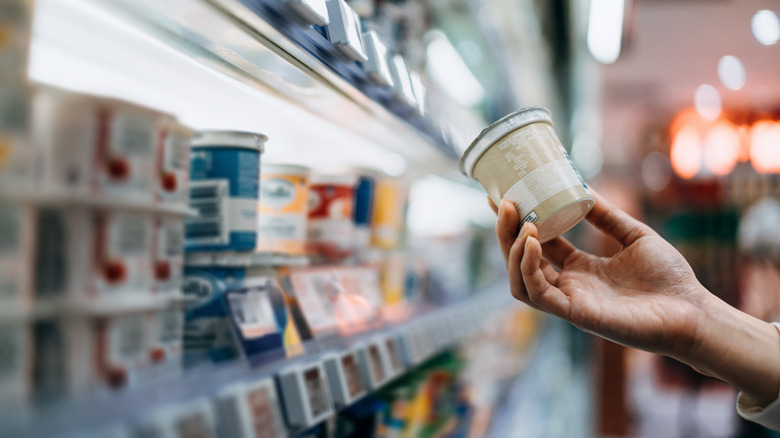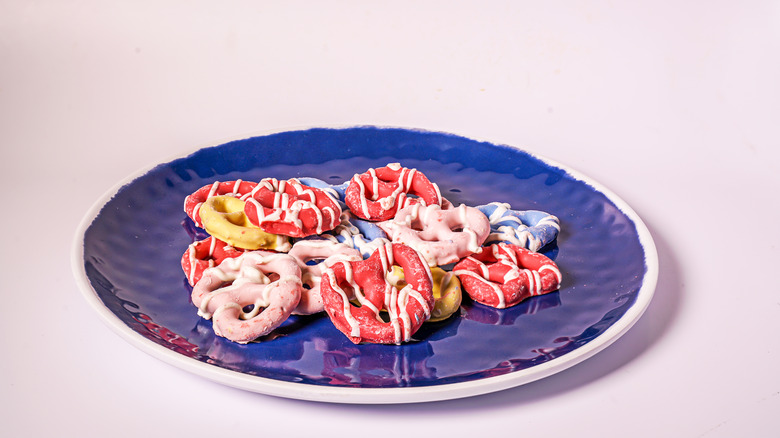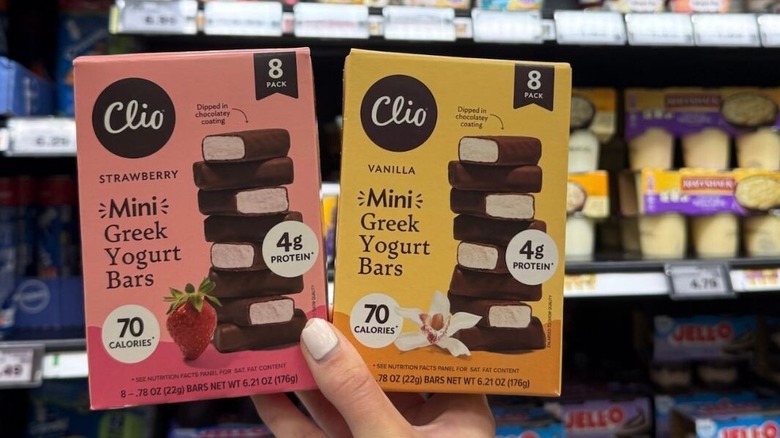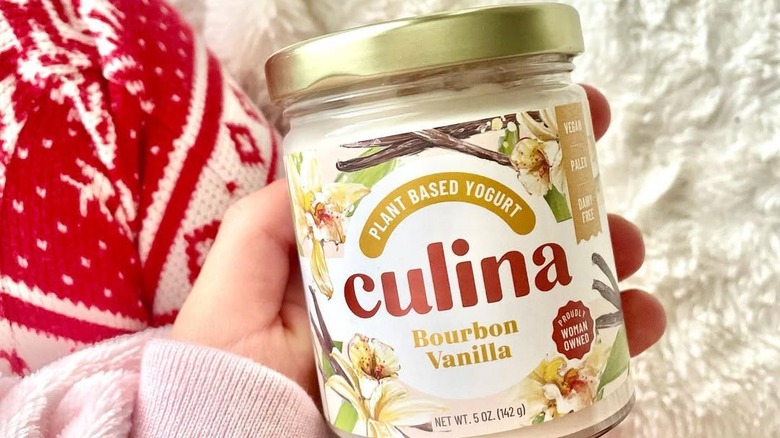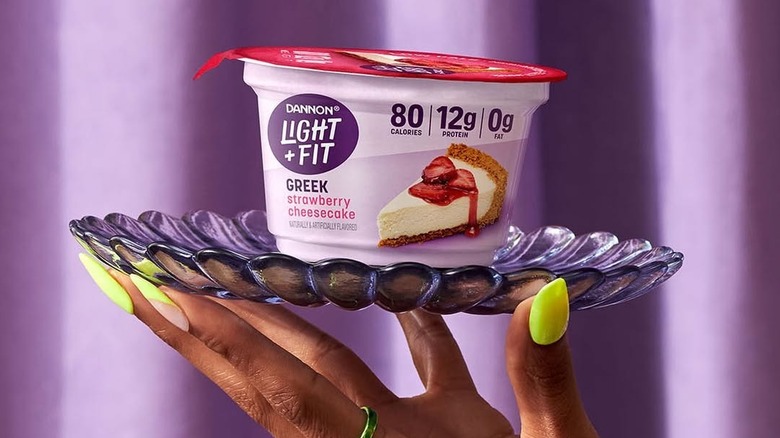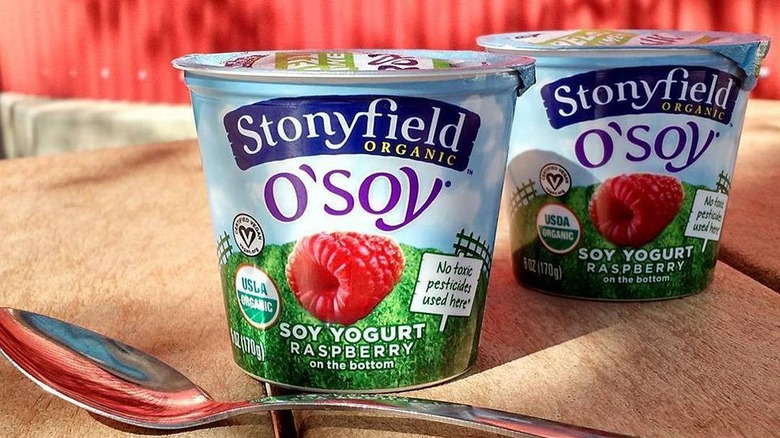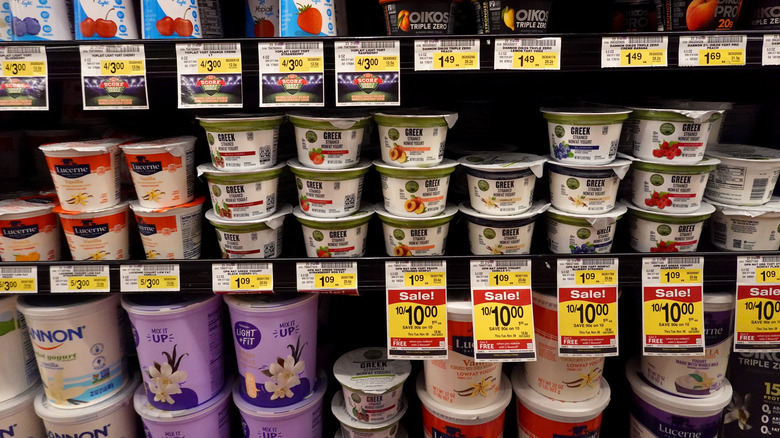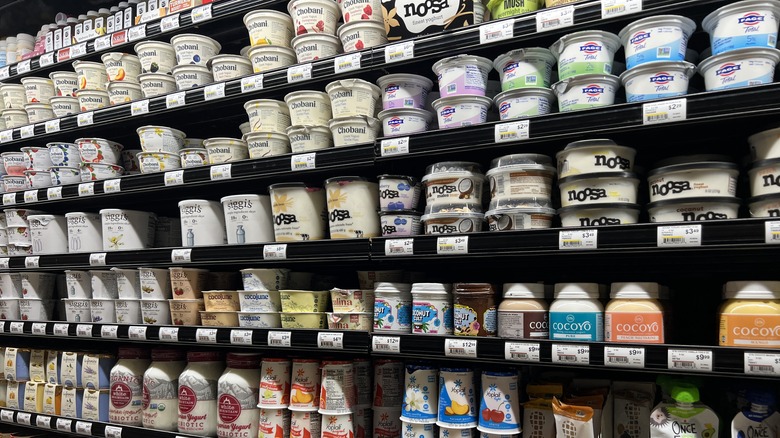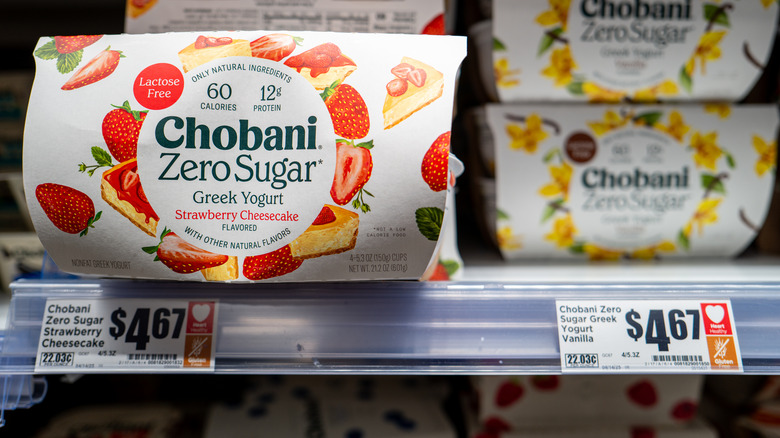These Are The 14 Worst Yogurt Recalls In History
Having a tub of yogurt in your fridge can be a lifesaver. Not only is it one of the few on-the-go snacks your gut will actually thank you for, it's also a surprisingly versatile cooking ingredient. Whether you're baking something that needs a hint of tart, upscaling your chicken marinade, or trying to tenderize ground beef without giving your arms a workout, there is almost limitless ways yogurt can come in handy.
On the flip side, yogurt can turn foe pretty quickly — and not just because you left it in the fridge for too long after opening it. From contamination with salmonella, listeria, E. coli, and even shards of glass, there's sometimes a lot more lurking in a creamy tub of yogurt than probiotic bacteria. And if that sounds too grave to be real, here's a roundup of the worst ways yogurt had found itself pulled off retail shelves over the years.
HP Hood LLC (2025)
Though it's bound to leave a much larger dent in your pocket, switching out regular yogurt for Greek yogurt is likely one of the most inspired food choices you'll ever make. Named straggisto in its motherland — a nod to the extra straining it undergoes to remove whey — Greek yogurt is creamier, richer in protein, and lower in sugar; hence infinitely more filling and beneficial to your health.
Sadly, even this upscale food of the gods is not immune to the very plasticky times we're living in — as was evident in January 2025, when New York-based dairy HP Hood LLC found itself pulling 15,834 cases of Wellsley Farms Vanilla Non-Fat Greek Yogurt from retail shelves in Kentucky, Maryland, and Connecticut over potential plastic contamination.
The recall was issued under Class II; reserved for products unlikely to cause lasting damage to your health. Nonetheless, taking in bits of plastic with your Greek yogurt — or with any food, really — can wreak all manner of havoc on your body. Beyond the immediate risk of intestinal blockage, scientists have found links between plastic and immune suppression, cardiovascular disease, and even cancer.
Wells Enterprises Inc. (2025)
Frozen yogurt versus ice cream: The debate rages on. The first's just one ingredient away from becoming a custard and packed with probiotics, but sweetened up a tad to cut some of that tang. The other's a lot smoother on the palate, but way fattier. But whichever side of this chilly divide you've aligned yourself with, May 2025 was not a great time to spring for either... at least not from Wells Enterprises, the Iowa-based dairy behind sought-after brands like Rocky Road, Cotton Candy, Mocha, and Country Rich Vanilla.
Why? Well, like it's done with the soil, the water, and even the very air we breathe, plastic found a way to sneak into a staggering 22 categories of ice cream and frozen yogurt manufactured by the company, resulting in a massive recall spanning 16,000 gallons of product. Bearing the brunt of the contamination was the vanilla frozen yogurt, with 5,280 3-gallon tubs impacted. Planet Smoothie ZSA Vanilla Flavored Fat Free Frozen Yogurt, the other frozen yogurt product involved in the recall, was hit a little more lightly, with just 937 3-gallon tubs making it to the recall list.
Knockroe Inc. (2025)
Yogurt's a pretty great dessert on its own. But if you're looking to kick it up to ultimate tarty dessert, then layering it with granola, nuts, and some summer fruit to make a delectable parfait is the way to do it. And if you just can't summon the wherewithal to do all that, the good news is that you can just pick up a pre-made yogurt parfait from your local grocery store aisle.
Even better: There are plenty of nut-free yogurt parfait options on the market if you've got a nut allergy. Although, as a just-in-case precaution, don't just content yourself with scanning the ingredients list. Go a step further and check the lot number on your purchase, because like customers who bought Bonya-branded low-fat yogurt parfaits in May 2025, you just might end up stocking your pantry with something that's likely to trigger severe anaphylaxis.
That might seem like a completely avoidable occurrence. After all, companies are required to declare all known allergens on the product label by law. But oversights do happen. In this case, Pennsylvania-based Knockroe Inc., the maker of these yogurt parfaits, failed to declare almonds as an allergen on the products' packaging. As a result, 113,676 units of mislabeled parfaits spanning 12 categories were recalled from retailers in New York, Massachusetts, New Jersey, and Pennsylvania.
Rizo-López Foods, Inc. (2024)
Listeria monocytogenes: Gunning for salmonella's crown when it comes to causing food-borne disease outbreaks since the '80s. This pesky, slow-growing bacteria has been behind some pretty massive outbreaks over the years, involving everything from Dunkin' baked goods, deli meats, and even bagged greens. It's especially a nuisance in the dairy industry due to its capacity to form biofilms and survive in extremely cold — even freezing — temperatures.
In 2024, it dealt a devastating blow to California-based Rizo-López Foods Inc., which was forced to recall multiple dairy products, including yogurt spanning four categories after they were linked to a multi-year listeria outbreak that caused two deaths, 23 hospitalizations, and one pregnancy loss across 11 states. The CDC estimated the scope of the outbreak to be much larger than reported, as most people who sicken with Listeria recover without ever needing medical attention.
Alarm bells went off after a CDC traceback investigation dating back as far as 2014 revealed listeria in queso fresco and cotija cheeses made by the company. Subsequent FDA inspections of Rizo-López's facilities uncovered listeria and multiple sanitation issues, which could explain why the contamination kept recurring year after year. Aside from pulling 120 categories of products from retail shelves nationwide, Rizo-López Foods was also forced to halt most of its operations after the FDA filed an injunction to stop the company from manufacturing and distributing a significant proportion of its inventory until its production standards were brought up to code.
Palmer Candy Company (2024)
When it comes to food contaminants, nothing's quite as dreadfully aggressive as Salmonella. Even retail heavy hitters like Walmart, Costco, and ShopRite can't seem to escape salmonella recalls. Responsible for innumerable outbreaks over the years, this bacterium can slip into your food from just about any angle — whether you're in the habit of eating raw flour or even simply treating yourself to a pretzel after a hectic day.
If you're thinking; raw flour, sure, no shocker there. But pretzels? Well, take the case of Palmer Candy Company, which in 2024 found itself recalling up to five categories of yogurt-coated pretzels sold in Walmart, Target, and Dollar General stores across 17 states over potential salmonella contamination. Also swept up in the recall were nearly two dozen white-coated snacks sold under an array of brand names, including Urge, Freshness Guaranteed, Casey's, Palmer, Favorite Day Bakery, Sunny Select, and Sconza Chocolates.
Palmer's voluntarily recalled the products after getting word from one of its suppliers that an ingredient used to make the white coating on the products was potentially tainted with Salmonella. Although no cases of food poisoning were linked to the tainted products, the company was still forced to shut down production of the affected product line until proper traceback could be performed.
Clio Snacks (2023)
The world's your oyster when you've got a tub of Greek yogurt in your fridge. You could turn it into banana pudding, make pizza dough, blend it into a smoothie, or even make a mayo-free tuna salad. If you're really motivated, you could go full send with a Greek yogurt-for-every-meal combo — breakfast, lunch, and dinner. Or, if you've got the production muscle of New Jersey-based Clio Snacks, you could whip up an inventory of Greek yogurt parfait bars and get entrepreneurial with it.
Be extra careful about how you make your parfaits, though, because like Clio Snacks, you might find yourself pulling massive quantities of product off the market due to contamination. And not just any kind of contamination; listeria, a bacteria implicated in some pretty disastrous disease outbreaks over the years, including some that caused hospitalizations, miscarriages, and even deaths.
Unlike most, this particular recall was not sparked by a multi-state outbreak, but by a report of contamination at a third-party production facility that Clio had outsourced to produce its Strawberry Granola & Greek Yogurt Parfait Bars. As a result, 581 cases of the potentially tainted parfaits distributed to Walmart stores across the country were removed from circulation.
Eat Real Food LLC (2022)
Gone are the days when dairy treats were completely out of reach for consumers with lactose intolerance or dairy allergies. Grocery stores now feature a veritable cornucopia of milk alternatives, and the wave has swept over to yogurt as well, with some dairies even switching entirely to non-milk production lines.
One such company is Austin-based Eat Real Food LLC, whose product portfolio includes Culina Yogurt, a type of yogurt that swaps milk for coconut cream. But while Eat Real's plant-based yogurt rendition proffers all the benefits touted by its dairy-based counterparts, June 2022 was probably not a great time to buy it. While it lacked dairy, it might have contained something just as likely to wreck your guts; glass fragments.
Fortunately, no adverse events were reported, partly because glass can sometimes pass through your gut without causing harm. And also because Eat Real acted fast, pulling a startling 54,168 cases of product spanning six categories, including Bourbon Vanilla, Strawberry Rose, and Peach Cashew from retail shelves before any harm could befall unsuspecting consumers.
Pure Eire Dairy (2021)
Consumers are now more than ever concerned about sustainability, and while many big dairies have yet to catch up, there has been a steady outcropping of smaller dairies eager to fill the market gap. One such was Pure Eire Dairy, a Washington-based pasture-based dairy that produced organic, grass-fed yogurt until 2021, when it was forced to exit the market after a pretty awful public health incident.
As it turned out, despite being organic, grass-fed, non-GMO, animal welfare approved, and A1 Beta Casein-free as touted on its website, Pure Eire's yogurt was no less likely to be contaminated with E. coli than any run-of-the-mill product on the shelf. Consumers had to learn this in a pretty brutal way in May 2021 when the company was forced to pull its entire production line from shelves across Washington state after it was linked to a multi-county E. coli outbreak. As many as 26 people across Washington State and neighboring Arizona fell sick, 11 were hospitalized, and five developed Hemolytic Uremic Syndrome; a serious E. coli complication that can lead to organ failure or even death.
What's worse? The outbreak didn't happen entirely by chance. A subsequent inspection by the Washington Department of Agriculture uncovered a slew of safety violations at the company's processing plant in Othello, including busted/poorly maintained equipment, moldy yogurt rack drain pans, peeling paint, and water pooling on the floors. Operations were suspended temporarily, but before they could resume, consumers came knocking with lawsuits, leaving the company completely dead in the water.
Danone North America (2018)
Grocery shopping in the early 2000s was a total minefield, especially if you happened to be among the 33 million Americans living with a food allergy. Inconsistent labeling practices and allergens veiled as natural additives meant that shoppers with food allergies were constantly playing Russian roulette on snack runs. Then came the Food Allergen Labeling and Consumer Protection Act (FALCPA) of 2004, which made it a legal requirement for food manufacturers to disclose known allergens like milk, peanuts, wheat, shellfish, eggs, fish, and soybeans on product packaging. This meant that the FDA could halt distribution of products that contained known allergens but didn't explicitly state that on the packaging.
This is exactly what happened to New York-based Danone North America, which in December 2018 was forced to recall 3,521 cases of Light & Fit Greek Crunch Nonfat Yogurt & Toppings S'Mores Flavor from retail stores across 13 states due to undeclared peanut allergen. The recall kicked off after the company discovered a packaging mix-up that led to the products being distributed with the wrong toppers. Thankfully, everything was wrapped up before any adverse events were reported.
Stonyfield (2017)
The plant-based yogurt market has blossomed significantly in recent years, what with increasing consumer demand for non-dairy alternatives due to dairy allergies or even sustainability concerns. Now, there are all sorts of plant-based alternatives on the market, made with just about every milk-able plant you can think of, including the pili nut, native to the Pacific Islands and the Philippines. And while time keeps proving that you can milk just about anything if you try hard enough, soy remains a go-to for many plant-based yogurt producers, like New Hampshire-based Stonyfield.
Something to note, though: Stonyfield doesn't deal exclusively in plant-based yogurts. It also has a thriving product line of dairy-based yogurts; a practice that ended up becoming somewhat of an issue in 2017. Things started taking a turn in October, when the company received word from customers that its O'Soy Strawberry soy yogurt, marketed and distributed as a plant-based product, inexplicably contained milk.
As a result, Stonyfield was forced to pull the entire product line from 18 states, including California, New York, New Jersey, Wisconsin, Florida, and Illinois. While no adverse events were reported, the risk potential for this recall was pretty high up there, considering that at least one in 50 Americans is allergic to milk and as many as 50 million others are lactose intolerant.
Yeo Valley (2016)
Rubber can come in pretty handy in the kitchen. For one, it makes stellar cutting boards that not only protect your knives from dulling over time but are also less likely to soak in bacteria and turn your countertop into a cross-contamination haven. Martha Stewart even recommends keeping a few rubber bands on hand to save yourself the physical anguish of prying open stubborn jars.
One place rubber is certainly not welcome, though, is your tub of yogurt. Yet this is exactly what happened in August 2016 when Blagdon, North Somerset-based Yeo Valley found itself recalling yogurt sold in multiple retail stores across the United Kingdom and Ireland over rubber contamination.
Oddly enough, Yeo Valley–branded yogurts were unaffected by the recall, which instead swept up dozens of yogurt varieties sold under household names like Asda, Tesco, Waitrose, Sainsbury's, and Co-operative. Although consumers who still had the yogurts in their pantry were urged to return them to their place of purchase for a refund, health officials deemed the risk level for consuming the products to be low, as rubber is pretty inert and can pass through the digestive tract without incident.
Blue Bell Creameries (2015)
Recalls are pretty commonplace in the food industry. They're so common that it's quite rare for food manufacturers to face consequences beyond pulling the product off the market. But as Texas-based Blue Bell Creameries can likely attest, rare doesn't mean never.
Unlike many in the industry, Blue Bell had enjoyed a squeaky-clean record, coasting through over 100 years without a single recall. That all changed in April 2015, when the company was forced to pull yogurt, ice cream, and sherbet products made in all of its production facilities from retail shelves across 23 states after they were linked to a listeria outbreak that caused 10 illnesses, 10 hospitalizations, and three deaths in Arizona, Oklahoma, and Texas.
A brutal fallout ensued. First came the financial toll, with the Lubbock Avalanche-Journal estimating that as much as 8 million gallons of ice cream alone were disposed in landfills. Next came the FDA-led on-site inspections, which uncovered a laundry list of safety violations, forcing the company to suspend activities in all its production facilities. That wasn't the end of it, though. Criminal and civil proceedings ensued, and by May 2020, the company was on the hook for fines and settlement fees amounting to a never-heard-before total of $19.35 million. Consequences spilled over to the company's executives, with former President Paul Krause facing conspiracy and wire fraud charges for allegedly trying to downplay the extent of contamination and deliberately misleading customers about the recall.
Chobani (2013)
Moldy food isn't necessarily a bad thing. For instance, a wedge of blue cheese covered almost entirely with fuzzy mold is something of a marvel, likely to first place at the American Cheese Society Awards. Molding yogurt, though, is a completely different story. While a piece of molding cheese is likely to tantalize your palate (though it's best to try an alternative if you're intimidated by mold), eating molding yogurt can end up wrecking your guts in some pretty ghastly ways.
And if you're in doubt, just ask any of the hundreds of folks who sickened after eating Chobani's Greek yogurt in late 2013. Linked to a type of mold called Mucor circinelloides, the illnesses sparked a recall of multiple Chobani Greek yogurts, including Chobani Champion, Chobani Flip, and Chobani Bite. The company also temporarily suspended activities and launched an extensive clean up of its Twin Falls, Idaho processing facility to remove all traces of contamination.
Kraft Inc. (1989)
Salmonella, shards of glass, rubber, plastic; all are pretty boilerplate in the wacky world of food recalls. But every now and then, recalls happen for a never-heard-before ghastly reason, like say contamination with actual poison. And if that seems far-fetched, consider the plight of New York-based Kraft Inc., which in 1989 found itself recalling Breyer's brand yogurt from 166 Acme stores across three states after a 17-year-old boy fell into a coma after eating yogurt adulterated with cyanide.
Follow-up investigations ruled out contamination in the same production lot and in separate batches, which left health officials suspecting that the yogurt had been tampered with post-distribution. Though no additional illnesses were reported, consumers were urged to return any yogurt containers with signs of tampering to Acme stores for a full refund.

